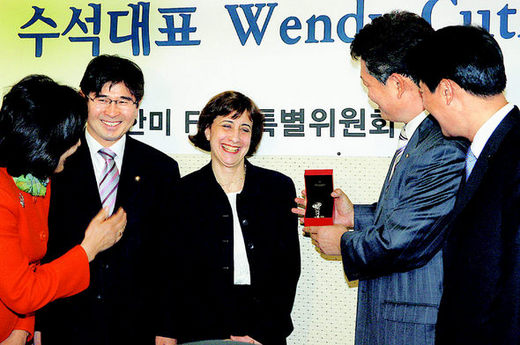 |
|
At the National Assembly on January 18, Song Yong-gil, a lawmaker from the ruling Uri Party, hands over a watch made at the joint Korean Gaesong (Kaesong) industrial complex to Wendy Cutler, top U.S. negotiator to the ongoing free trade talks between South Korea and the U.S. Washington has so far refused Seoul's demands that goods made at the Gaesong complex, just across the North Korean border, be included as South Korea-made goods in the trade deal.
|
Move would leave both corporate and private customers vulnerable, critics say
In the proposed free trade agreement (FTA) with Washington, Seoul plans to grant U.S. financial companies doing business in South Korea access to sensitive customer information at their overseas offices. Such a situation is expected to cause a controversy over leakage of individual information and companies’ operational secrets. According to a confidential report on the ROK-U.S. FTA obtained by the Hankyoreh on January 18, in connection with the U.S. demand that financial information be processed at company headquarters in the U.S., Korean trade negotiators decided to allow this within the first two years after the FTA takes effect. In this case, information of not only private but also corporate customers will be available to U.S. financial firms. Ha Jun-gyeong, a researcher of the Korea Institute of Finance, said, "Customer and corporate information can be exposed to foreign nations, and side effects may occur."Kim Sang-jo, director of the Solidarity for Economic Reform, warned that the U.S. financial authorities would not take measures to regulate information leakages and the South Korean authorities also would not be able to prevent these leaks from occurring. In addition, South Korea is reportedly discussing a plan to leave the management of not only dollar-denominated assets but also won-denominated assets, including pension funds, to U.S. asset management companies. The report says that the matter will be discussed during the 7th round of FTA talks, slated for February, with South Korea’s proposed position that the situation will be accepted for the first two years of the free trade pact. If this is allowed, domestic asset management firms will lose a 76.8-billion-won (US$82.2-million) market share every year, according to the Korea Securities Research Institute. The two nations have focused their discussion on 16 financial issues. South Korea has decided to exert its efforts on making policy strides on three "core issues," such as its opposition to a U.S. demand to include government-run banks into the trade agreement. Related to the insurance services provided by Korea Post, the nation agreed to accept some of the U.S. demands. The Korea Post insurance plan will reportedly be supervised under the financial regulatory service from the information ministry, an answer to U.S. criticisms that the system was not subject to proper market competition and regulation. However, South Korea’s demands regarding the insurance matters of the free trade pact are just at a stage of discussion in the United States. In the U.S., insurance services are governed by state laws, not federal laws. Seoul has urged Washington to settle these law-related problems, but there has been no response from Washington. Please direct questions or comments to [englishhani@hani.co.kr]






